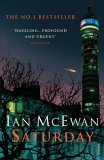
Unable to sleep, he looks out the bedroom window early on a Saturday morning and sees what looks a plane on fire, blazing through the sky, descending to an uncertain future.
The book follows Perowne through his eventful day. Early morning conversations with his jazz-playing son, driving through the central London streets, an aggressive altercation after a scrape in the car, playing squash with a competitive colleague, visiting his mother and calling in at rehearsals to hear a new song. All the while, anti-war protesters are marching nearby through the capital.
Perowne seems to be increasingly on the back foot as the day progresses, more and more out of control with events. Familiar tasks and patterns are more complicated today. Even looking out the window brings the possibility of seeing tragedy. His actions too - including the minor offence of driving across a road closed to traffic - have consequences for the rest of his day. And perhaps for his family too. Yet his mind remains rational and clear - at odds with the manic world around him. Even when threatened, he can't help but diagnose the illness of his attacker.
The culmination of all this activity is a family reunion, with his daughter flying in from Paris. An unexpected violent twist invades this family scene, shaking the family - yet Perowne remains calm as the situation threatens to spiral out of control.
It's a very personal 24 hours spent with Perowne. He demonstrates his personal poise and morality. He shows his concern for individuals, and his ability to stand up for his beliefs when challenged by another person. Yet he has less time for the feelings of the masses, of those further away - the anti-war protestors and the citizens of Iraq.
How can he protect his vulnerable family? Is revenge appropriate - particularly when an easy opportunity presents itself. The final pages log Perowne's thinking as he analyses his response. In some ways he has done nothing wrong; yet by saving a life he has committed a man to torture, to a continued life with an affliction.
It's the first Ian McEwan book I've read, and it wouldn't put me off reading another. While it's not quite as riveting as the early series of 24 and there’s too much descriptive prose at times for my liking, the story keeps moving towards its satisfying conclusion.
No comments:
Post a Comment